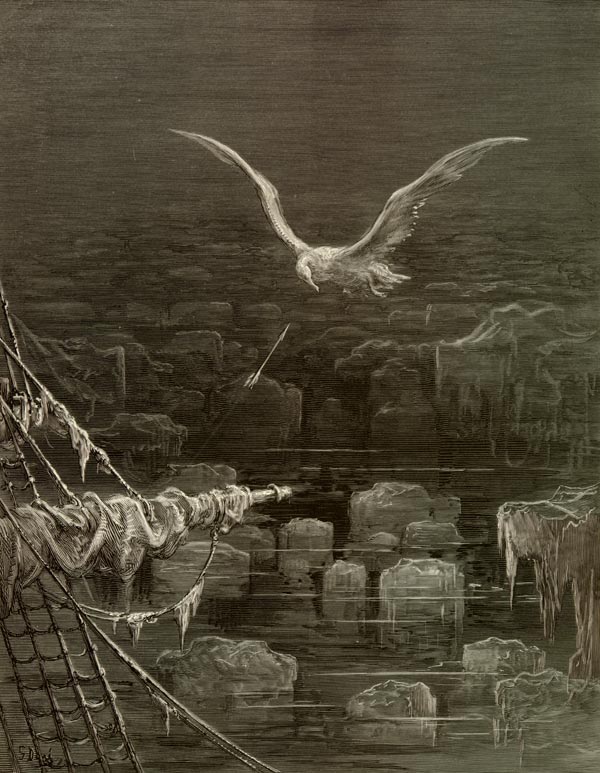Ah ! well a-day ! what evil looks
Had I from old and young !
Instead of the cross, the Albatross
About my neck was hung.–From The Rime of the Ancient Mariner by Samuel Taylor Coleridge
The line between free thought and subjugated thought is thin but absolute and can be determined with a simple question that requires no modification of current beliefs: If there is no God, if we are all that is, would you want to know?
I believe abjectly that human potential is virtually limitless. We have just scratched the surface of what we can do and become. Unfortunately, we are constrained by a fatal flaw in our design (it also happens to be one of our greatest attributes):
Faith.
I’m not just talking about religious faith–although religion is a crucial aspect. I’m talking about faith as the trust we have that we are correct about what we believe (i.e., hold to be true). Because of that trust we make presumptions. We hold some presumptions so dearly that we actually consider questioning them taboo. But presumption is simply unfounded belief, no matter how logical it may seem or profoundly we may believe it. Religion then exalts these unfounded beliefs as the Will or Law of supreme and/or supernatural beings–who are themselves unfounded beliefs. It uses evidence to justify–rather than evaluate–beliefs and either disregards or denounces contradictory evidence (such as evolution and radiometric dating).
It may seem like I’m calling humankind delusional, but as instinctive and intuitive animals, we are right so much of the time–purely by guessing–that belief has become innate. Whether it’s navigating through traffic, recognizing whether a door is automated or manual, or realizing that an unattended child is getting into something, we guess right an overwhelming majority of the time. It verifies our faith. It’s probably why it’s so embarrassing and even unsettling when we’re wrong; we’ve failed in our perception of reality.
Faith was crucial when we were ignorant of the natural world. But as we have passed from the age of faith, through the age of reason, and into the age of knowledge it has become imperative for us to re-evaluate the principles and processes by which we discern what is true.
We have not only acquired more knowledge–beliefs supported by evidence–we’ve gotten better at acquiring it; knowledge chafes against the limits of faith, religious or otherwise. Our understanding of the world, once buttressed by faith is becoming increasingly imprisoned by it. We resist accepting new truths because they may dispel older ones.
It has become untenable.
If we are skeptical–which is to say we presume as little as possible, only accepting beliefs supported by evidence–we can get closer to the reality of existence than we ever could by faith in unfounded beliefs. Because that faith may be displaced. Skepticism is the purest search for truth and truth encompasses all possibilities.
So this is not to denounce religious beliefs. The exploration of a transcendental origin, nature, or purpose for existence is at the very least well-intentioned. And it may very well be true. But until it is supported by evidence, it is only a belief in what is possible and therefore should neither be the basis for social law nor the arbiter of morality.
The only way to liberate thought is to prioritize truth. Science and philosophy which share this mandate with religion, will always trump religion because science and philosophy admit to fallibility. A core tenet of scientific method is scrutiny through peer review and the first rule of philosophy is that we may be wrong about everything. Meanwhile religion, particularly Christianity, Mormonism, Islam, and Judaism, profess, without evidence, to relay the infallible, yet wildly interpretive, word of God. None hold up to objective scrutiny. Their only defense is to restrict investigation, deny contradiction, and denounce skepticism.
It’s been successful. We have been programmed to avoid intellectual conflict. Never talk about politics or religion. By default I would add money to that list. But these are the core, substantive issues affecting the quality of life on earth. What better to talk about than money, politics, and religion? Or should billions suffer and starve so no one has to admit they may be mistaken?
When we are wrong–which is inevitable–failing (or refusing) to re-examine what we hold to be true diminishes our potential. We deny possibilities for no reason outside our own minds. It limits our ability to understand, even to question.
Thus faith has become the albatross around the neck of human thought.
We absolutely must free ourselves from the yoke of this superstition. We must define truth as beliefs justified by–and better, arising out of–evidence and always subject to greater truth. Only skeptical reason, tempered by compassion, can elevate society beyond unfounded belief and into the realm of knowledge in the noble quest to understand.
Free thought.



Your words and thoughts are poetry of the mind. Good stuff.
I think no matter how good a life any of us has, humans strive for something greater and better. If not in this life, then the next. Not being able to accept that this is it helps fuel faith, for better or for worse.
Thanks for the kind words. Another thing to consider is that homo sapiens start appearing in the fossil record about 195,000 years ago. Written history only goes back 7,000-8,000 years at which time modern humans had already established tradition rich cultures around the globe–with several recurring themes. So we’re up against environmental and social programming that has probably been ingrained in us over tens of thousands of years.